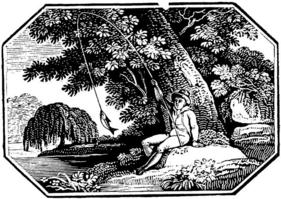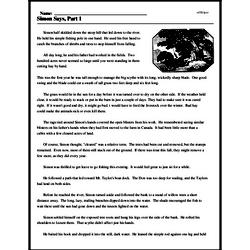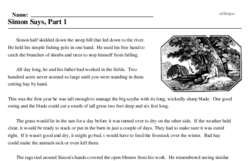Simon Says, Part 1
Simon half skidded down the steep hill that led down to the river. He held his simple fishing pole in one hand. He used his free hand to catch the branches of shrubs and trees to stop himself from falling.
All day long, he and his father had worked in the fields. Two hundred acres never seemed so large until you were standing in them cutting hay by hand.
This was the first year he was tall enough to manage the big scythe with its long, wickedly sharp blade. One good swing and the blade could cut a swath of tall grass two feet deep and six feet long.
The grass would lie in the sun for a day before it was turned over to dry on the other side. If the weather held clear, it would be ready to stack or put in the barn in just a couple of days. They had to make sure it was cured right. If it wasn't good and dry, it might go bad. t would have to feed the livestock over the winter. Bad hay could make the animals sick or even kill them.
The rags tied around Simon's hands covered the open blisters from his work. He remembered seeing similar blisters on his father's hands when they had first moved to the farm in Canada. It had been little more than a cabin with a few cleared acres of land.
Of course, Simon thought, "cleared" was a relative term. The trees had been cut and removed, but the stumps remained. Even now, most of them still stuck out of the ground. If there was time this fall, they might remove a few more, as they did every year.
Simon was thrilled to get leave to go fishing this evening. It would feel great to just sit for a while.
He followed a path that led toward Mr. Taylor's boat dock. The Don was too deep for wading, and the Taylors had land on both sides.
Before he reached the river, Simon turned aside and followed the bank to a stand of willow trees a short distance away. The long, lazy, trailing branches dipped down into the water. The shade encouraged the fish to wait there until the sun had gone down and the insects lighted on the water.



